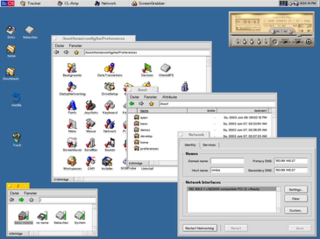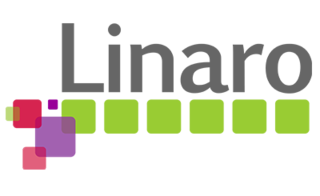Related Research Articles

BeOS is a discontinued operating system for personal computers that was developed by Be Inc. It was conceived for the company's BeBox personal computer which was released in 1995. BeOS was designed for multitasking, multithreading, and a graphical user interface. The OS was later sold to OEMs, retail, and directly to users; its last version was released as freeware.
Adobe Flash is a multimedia software platform used for production of animations, rich internet applications, desktop applications, mobile apps, mobile games, and embedded web browser video players.

Palm OS was a mobile operating system initially developed by Palm, Inc., for personal digital assistants (PDAs) in 1996. Palm OS was designed for ease of use with a touchscreen-based graphical user interface. It is provided with a suite of basic applications for personal information management. Later versions of the OS have been extended to support smartphones. The software appeared on the company's line of Palm devices while several other licensees have manufactured devices powered by Palm OS.

GPE is a graphical user interface environment for handheld computers, such as palmtops and personal digital assistants (PDAs), running some Linux kernel-based operating system. GPE is a complete environment of software components and applications which makes it possible to use a Linux handheld for tasks such as personal information management (PIM), audio playback, email, and web browsing.

MontaVista Software is a company that develops embedded Linux system software, development tools, and related software. Its products are made for other corporations developing embedded systems such as automotive electronics, communications equipment, mobile phones, and other electronic devices and infrastructure.
OpenMAX, often shortened as "OMX", is a non-proprietary and royalty-free cross-platform set of C-language programming interfaces. It provides abstractions for routines that are especially useful for processing of audio, video, and still images. It is intended for low power and embedded system devices that need to efficiently process large amounts of multimedia data in predictable ways, such as video codecs, graphics libraries, and other functions for video, image, audio, voice and speech.
OMA SpecWorks, previously the Open Mobile Alliance (OMA), is a standards organization which develops open, international technical standards for the mobile phone industry. It is a nonprofit Non-governmental organization (NGO), not a formal government-sponsored standards organization as is the International Telecommunication Union (ITU): a forum for industry stakeholders to agree on common specifications for products and services.
Wind River Systems, also known as Wind River, is an Alameda, California–based company, subsidiary of Aptiv PLC. The company develops embedded system and cloud software consisting of real-time operating systems software, industry-specific software, simulation technology, development tools and middleware.
The Open Mobile Terminal Platform (OMTP) was a forum created by mobile network operators to discuss standards with manufacturers of mobile phones and other mobile devices. During its lifetime, the OMTP included manufacturers such as Huawei, LG Electronics, Motorola, Nokia, Samsung and Sony Ericsson.
Qualcomm Atheros is a developer of semiconductor chips for network communications, particularly wireless chipsets. The company was founded under the name T-Span Systems in 1998 by experts in signal processing and VLSI design from Stanford University, the University of California, Berkeley, and private industry. The company was renamed Atheros Communications in 2000 and it completed an initial public offering in February 2004, trading on the NASDAQ under the symbol ATHR.
The Access Linux Platform (ALP) is a discontinued open-source software based operating system, once referred to as a "next-generation version of the Palm OS," for mobile devices developed and marketed by Access Co., of Tokyo, Japan. The platform included execution environments for Java, classic Palm OS, and GTK+-based native Linux applications. ALP was demonstrated in devices at a variety of conferences, including 3GSM, LinuxWorld, GUADEC, and Open Source in Mobile.
The Consumer Electronics Linux Forum was a non-profit organization to advance the Linux operating system as an open-source software platform for consumer electronics (CE) devices. It had a primarily technical focus, working on specifications, implementations, conferences and testing to help Linux developers improve Linux for use in CE products. It existed from 2003 to 2010.

The Linux Foundation (LF) is a non-profit organization established in 2000 to support Linux development and open-source software projects. In addition to providing a neutral home where Linux kernel development can be protected and accelerated, the LF is dedicated to building sustainable ecosystems around open-source projects to accelerate technology development and commercial adoption.

The Palm Foleo was a planned subnotebook computer that was announced by mobile device manufacturer Palm Inc. on May 30, 2007, and canceled three months later. It intended to serve as a companion for smartphones including Palm's own Treo line. The device ran on the Linux operating system and featured 256 MB of flash memory and an immediate boot-up feature.

The Tizen Association, formerly the LiMo Foundation, is a non-profit consortium which develops and maintains the Tizen mobile operating system. Tizen is a Linux-based operating system for smartphones and other mobile devices. The founding members were Motorola, NEC, NTT DoCoMo, Panasonic Mobile Communications, Samsung Electronics, and Vodafone. The consortium's work resulted in the LiMo Platform—which was integrated into mobile phone products from NEC, Panasonic and Samsung—and later became the Tizen platform.

The Open Handset Alliance (OHA) is a consortium of 84 firms to develop open standards for mobile devices. Member firms include HTC, Sony, Dell, Intel, Motorola, Qualcomm, Texas Instruments, Google, Samsung Electronics, LG Electronics, T-Mobile, Nvidia, and Wind River Systems.
A mobile operating system is an operating system for smartphones, tablets, smartwatches, smartglasses, or other non-laptop personal mobile computing devices. While computers such as typical/mobile laptops are "mobile", the operating systems used on them are generally not considered mobile ones, as they were originally designed for desktop computers that historically did not have or need specific mobile features. This line distinguishing mobile and other forms has become blurred in recent years, due to the fact that newer devices have become smaller and more mobile unlike hardware of the past. Key notabilities blurring this line are the introduction of tablet computers and light-weight laptops and the hybridization of the two in 2-in-1 PCs.
Movial is a privately held software engineering company focused on Internet enabled devices in consumer electronics and telecommunications industries. The company’s services include device concept and user interface (UI) design, third-party application, service and platform integration, consulting, training, product maintenance and support.

Linaro is an engineering organization that works on free and open-source software such as the Linux kernel, the GNU Compiler Collection (GCC), QEMU, power management, graphics and multimedia interfaces for the ARM family of instruction sets and implementations thereof as well as for the Heterogeneous System Architecture (HSA). The company provides a collaborative engineering forum for companies to share engineering resources and funding to solve common problems on ARM software. In addition to Linaro's collaborative engineering forum, Linaro also works with companies on a one-to-one basis through its Services division.

oneM2M is a global partnership project founded in 2012 and constituted by 8 of the world's leading ICT standards development organizations, notably: ARIB (Japan), ATIS, CCSA (China), ETSI (Europe), TIA (USA), TSDSI (India), TTA (Korea) and TTC (Japan). The goal of the organization is to create a global technical standard for interoperability concerning the architecture, API specifications, security and enrolment solutions for Machine-to-Machine and IoT technologies based on requirements contributed by its members.
References
- ↑ Gohring, Nancy. New mobile Linux group launches . Computerworld. November 14, 2005.
- ↑ LiPS synchs with OMA on mobile Linux, Register Developer, October 1, 2007